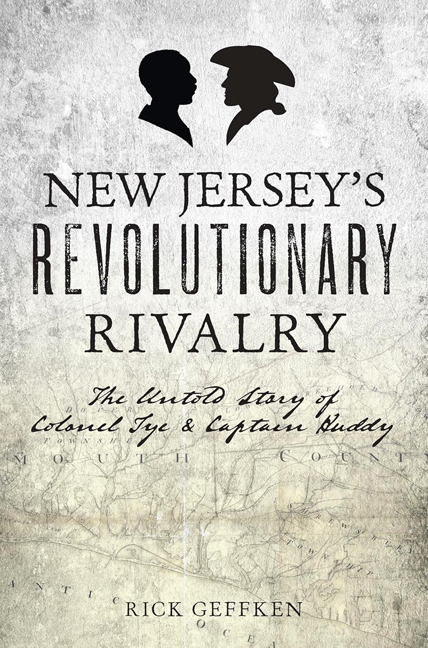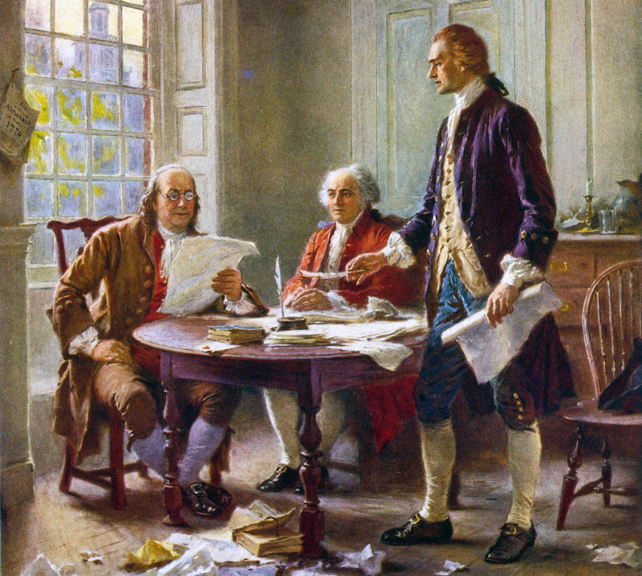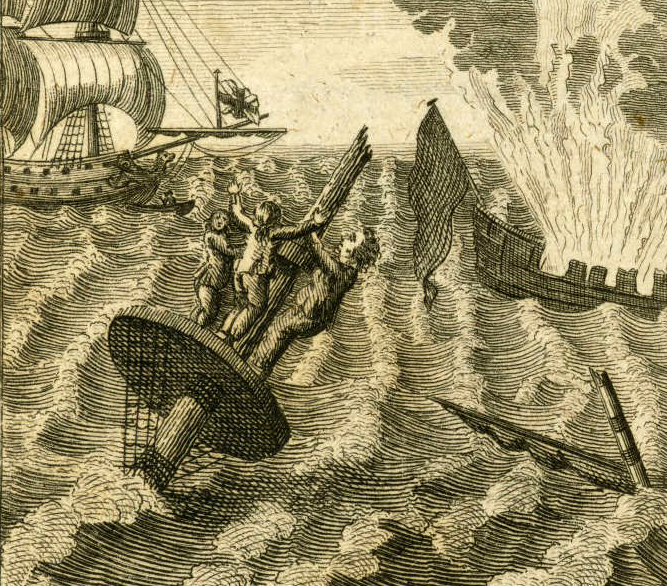Most people don’t know this, but Hugh T. Harrington is the reason that the Journal of the American Revolution exists. I remember calling him one night in August 2012 and sharing my crazy idea. I spent several minutes explaining the master plan for an online magazine, the need for a memorable website address, and the potential for printed publications. And then I told him I could make it all happen in a short amount of time, but I needed his guidance and eye for historical accuracy. For the balance of our call, Hugh spoke with a distinct, verbal adrenaline rush. He was so excited that he didn’t even flinch when I said I’d also lean on him to manage most of the writing for the first couple months after launch. From August through December 2012, my napkin sketch of allthingsliberty.com was brought to life with the help of Hugh’s almost daily emails and phone calls. Hugh provided a critical eye and never hesitated to tell me when he hated something. There were a few heated disagreements early on, but the results were always an improvement to the journal. Then, in January 2013, we launched. Hugh carried us, writing the majority of our articles for the first several weeks—long enough to gain momentum and attract more writers. Today, more than 80 writers, 500 articles and 1 million readers later, Hugh remains our most prolific contributor with 40-plus articles published under his byline. Because of this, I couldn’t think of a better person to kick-start our new contributor interview series. Periodically, over the next several months, we’ll share Q&As with other frequent JAR writers like Don N. Hagist, J. L. Bell, Bob Ruppert, Christian McBurney, Jim Piecuch, Ray Raphael, John L. Smith, Jr., Michael Barbieri, Michael Cecere, Michael Schellhammer, Thomas Fleming, Thomas Verenna, Wayne Lynch and others. Take it away, Hugh…
What inspired you to start researching and writing about the Revolution?
I had been casually reading American history including the Revolution for years. A time came when I was seriously casting about looking for something to sink my teeth into. The company I worked for had a conference in Hershey, PA. One day was devoted to golf. I don’t play golf. I considered going to Gettysburg when suddenly it occurred to me that I ought to visit Valley Forge and Brandywine, after all I had an ancestor who was at both places. I left at dawn. I spent several hours at Valley Forge then moved on to Brandywine. At the small visitor center I asked for directions to the Birmingham Meeting House as my ancestor had been in that vicinity. There had been visitors at Valley Forge but not many. I had Brandywine to myself. After having walked for miles and hours on sacred turf I decided that I’d devote some serious time to the American Revolution. I’m still at it. The date was August 26, 1993.
What historians or books have most influenced your work?
Kenneth Roberts’ historical novels Northwest Passage, Arundel, Rabble in Arms and Oliver Wiswell were devoured as a young adult during late night reading sessions. I continue to be drawn to them and every few years I reread them. There’s a great deal of history in those fictionalized tales. However, more than the history or the fiction there is the proper “feel for history” that I found irresistible; and still do. That “feel” sets the stage for non-fiction study.
What are your go-to research resources?
Initially, I go to Mark Boatner’s Encyclopedia of the American Revolution.
Which of your own JAR articles is your favorite or most rewarding? Why?
Selecting favorite articles is as difficult as deciding which of your children you love most. I would say Was General Anthony Wayne Murdered? ranks among my top favorites. It is a case of thinking outside the box. I believe I may be the first person to suggest that Wayne did not die of natural causes and point the finger at James Wilkinson as a suspect. While I have no smoking gun I think it’s a pretty good case. People have been executed for less. And, I think I may be right.
The Myth of Rifleman Timothy Murphy is another favorite. I am irritated by myths clouding our true history. The myth about Murphy I found particularly galling as it was repeated as gospel for 150 years based on no evidence at all. Clearly, no historian had ever gone back to the original source to see where the story came from. Exposing the myth of Murphy has been satisfying.
The article Financial Hero exposes the myth and misinformation about the role that Hyam Salomon played in the American Revolution. There are still people who seek recognition and compensation for his alleged contributions which is entirely unfounded. This has been going on for almost two hundred years…and it doesn’t bear up to historical scrutiny.
I have to mention the article Charles Willson Peale’s ‘Riffle With a Tellescope to it’ as a favorite simply because it illustrates the ingenuity of a man’s idea that was ahead of its time.
Lastly, and regretfully the last, I mention The Strange Odyssey of George Merchant, Rifleman because his role in the war has seemingly become lost. Captured at Quebec he was taken to England to presumably be hanged for treason. Mysteriously he returns to America with copies of the treaties between King George III and the German states regarding the hiring of mercenary troops destined for America.
Other than your own contributions, what are some of your favorite JAR articles?
This is tough. There are dozens and dozens of articles that I find extremely impressive. There are Ray Raphael’s mythbusting America’s First Declaration of Independence, Thomas Paine’s Inflated Numbers, Molly Pitcher and Captain Molly, Mary Hay McCauley’s Claim to Fame. Wayne Lynch’s outstanding work on the war in the South including (among others) Elijah Clarke and the Georgia Refugees Fight British Domination, The Georgia Refugees Turn the Tide Against the British, Victory for the Georgia Refugees. Norman Fuss’ Billy Flora at the Battle of Great Bridge. J.L. Bell’s two part article on No Taxation Without Representation. Merv O. Ahrens’ unusual The Impact of Jonathan Carver’s Journal and Maps. The list could go on and on.
What books about the American Revolution do you most often recommend?
When someone isn’t quite sure whether he wants to get into the study of the Revolutionary War I recommend five books: Ray Raphael’s The First American Revolution, David Hackett Fischer’s Paul Revere’s Ride and Washington’s Crossing plus John Buchanan’s The Road to Guilford Courthouse and Edward G. Lengel’s General George Washington, a Military Life. If the potential history junkie reads those five books he’s hooked and will be a Revolutionary War addict for life….and, I’ll have made a friend.
What new research/writing projects are you currently working on?
Flatboats and amphibious operations including Throg’s Neck, Pell’s Point, and Charleston in 1776.
Battle of Stony Point
What other hobbies/interests do you enjoy?
I am interested in WWII with an emphasis on the air war in Europe. I volunteer at a Flight Training Museum in Douglas, Georgia. Whenever possible I fly in vintage aircraft. I collect and shoot antique firearms. For years I studied the work of Sherlock Holmes and more recently have become involved with the Oregon Trail as well as the Lewis and Clark expedition.
Why is Journal of the American Revolution important to you?
In the late summer of 2012 Todd Andrlik and I were discussing the problem of finding a suitable place that would publish our history articles. Paper journals usually were published quarterly, carried few articles per issue and were geared toward an academic audience. Realistically, our articles would not see the light of day for years, if at all. In addition, there was the insurmountable problem that we wanted to generate articles far faster than print publications could manage. There was no online market for our history output. Todd conceived the idea of creating our own online journal. I had no idea how such a platform would be made, how we would find quality historians or convince them to submit their work to us. Todd assured me that he could handle the technical aspects as well as attract excellent articles. The idea evolved rapidly and almost immediately we knew there was great potential for writers and readers. To paraphrase Thomas Paine, we had it in our power to begin the history-article publishing world over again.
Todd, the mastermind and whirlwind behind the Journal, more than made good on his predictions. He created a place where high quality, peer reviewed articles appear on an almost daily basis. The articles are lively, readable and often break new ground. More so, the online journal provides for instant discussion and interactivity among readers, writers and editors, which is vital.
The Journal of the American Revolution was born on the phone. It has grown beyond my wildest imaginings. It is now the source for the history of the American Revolution. The Journal is important to me because I was a Founder and because I see the Journal filling a much needed chasm (not to be confused with a niche) in the presentation of the American Revolution to the world.
Is there an article, or subject area, that you would like to see appear in JAR?
The American Revolution was part of a larger war which had implications on the war in North America. I would like to see articles on the war in other parts of the globe. Also, articles on the war in the Caribbean.
The British were fighting in North America while their main base was in England across the Atlantic. I would like to see articles on the logistics involved in supplying as well as communicating with an army and navy at such a distance.








15 Comments
Thank you for an excellent beginning to this series. As with most articles on this site, as I’m in the early stages of taking my interest in the Revolution to the next level I continue to find new resources.
My Amazon wishlist continues to grow and grow and grow.
Kyle, Amazon is a wonderful source for used books. I can’t tell you how many good references I have come up with for little more than the price of shipping.
Wayne,
I second that, as well as abebooks.com (also an Amazon company), which will get you the really obscure, hard to find books you might want, many with free shipping.
Gents,
I use http://used.addall.com/ which has the used book sites you mentioned plus many others. It is the most comprehensive site for used books. It’s an awkward position to be in…being a book author then suggesting that people buy used books where the author gets no royalties. Almost as “bad” as suggesting someone go to a library (where the author gets no royalties). 🙂
Good news Hugh, by the time I am through highlighting, bending pages, and writing all over the margins, my books are no longer viable to be resold. 🙂
Hugh, in answer to your desire to see more about the Revolution as a global war, my upcoming book, After Yorktown (to be published spring 2016 by Westholme), has a comprehensive look at the Revolution’s battles and men who fought from India to Hudson Bay, Guiana to Gibraltar. Later this year, I plan to write about some of these events for JAR.
I am exceptionally excited to see this book — I can’t wait! As part of my project of writing novels based in each of the Colonies, I intend to examine the events of these more distant fields of operation. This sounds like a spectacular resource!
Hi Don,
I look forward to your book in 2016. The topic sounds great and Westholme publishes excellent books!
Thanks,
Brian
Kyle, welcome to the world of the American Revolution. Start making bookshelf expansion plans as they’ll be needed urgently. Don, I look forward to your JAR article and to your upcoming book. Very exciting.
The world of golf lost out when you decided to skip out that day. But the world of the American Revolution definitely won with your decision. And so did the lives of people all over who have always wanted to know about that subject, but would never or could never sit through another stale history book.
I’m very glad the first Contributor Close-up is fittingly you, Hugh!
John, so very kind of you. It means a great deal, especially coming from such a scholar as yourself.
Worthy praise for you, Hugh. Hopefully, we’ll meet should you visit the northern theater sometime.
Great Job Hugh!
Thank you for providing recommendations and its great to see inside the mind of the Editors! I look forward to your writings on Stony Point. Its a great historic site to visit.
Brian
Hugh & Todd,
Thank you so much for creating this wonderful on-line magazine! Everyday I check for a new article. I am a diehard Revolutionary War buff and avid reader and am currently reading books by Don Hagist, John Ferling and Tim McGrath. I am also a member of the American Revolution Roundtable of Philadelphia.
I was delighted to read that Kenneth Robert`s great works are of significant interest to you (Hugh). I just finished Oliver Wiswell. What a tremendous portrayal of the American Loyalist`s perspective – probably the most compelling I have yet to encounter on this subject! I am a direct descendant of a Loyalist family from Long Island, NY.
Thanks again!
John Pearson
John – I’m delighted that you’re enjoying the Journal and that you’re coming back daily. You’re reading good books. I’m a great fan of Oliver Wiswell. I recall the first time I read it years ago and thinking how strange it was that “the good guys were the bad guys.” It gives a whole different perspective to Tory/Whig conflict.